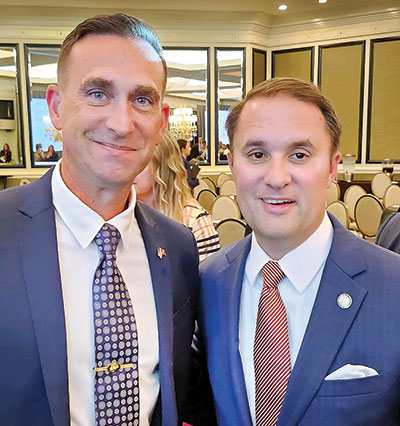Some of the worst cases of human trafficking happened right under the watchful eye of a loving parent or a trusted organization, said Deputy Christopher Easter of the Middlesex County’s Sheriff’s Office.
The sinister realities of human trafficking were the focus of Virginia Attorney General Jason S. Miyares’ second annual Human Trafficking Summit, conducted in Richmond recently.

Deputy Easter attended the collaborative conference that brought together human trafficking survivors, anti-human trafficking nonprofit leaders, government and law enforcement leaders from across Virginia to provide education through discussion of the latest trends and indicators, lived first-hand experiences, and the sharing of developed solutions.
While this may not seem like a crime that impacts rural communities such as Middlesex, as Deputy Easter learned, this couldn’t be farther from the truth.
Isolation and mobility
Rural areas have characteristics that can make trafficking both harder to address and identify, explained Deputy Easter. Middlesex County, like so many rural communities across the nation, has different vulnerabilities from those of cities. Geographic isolation, lack of awareness, lack of job opportunities, and very often ample access to highways are means to further these crimes.
Of the nation’s 4.1 million miles of public access roads, 2.9 million miles, or 71%, are in rural areas. And, in Virginia VDOT operates the third largest state-maintained highway system in the country, just behind North Carolina and Texas. Of the 58,000 miles of Virginia highways, 1,118 miles are connected to states and major cities .
Jarring Facts
Miyares’ summit revealed some startling facts. “I think many of us had a narrow understanding about what exactly human trafficking is, how it looks and where it happens,” said Deputy Easter.
“This crime doesn’t care if you are from a large city or a small town and it can, and is, affecting people of all socio-economic backgrounds, ages, and genders.”
To Deputy Easter and many summit attendees, it was “jarring” to learn that trafficking happens in a situation that seems safe, such as right under the watchful eye of a loving parent or a trusted organization.
“Boy-friending”
Individuals who fall victim to trafficking are not always lured away. Often, a vulnerable person is coerced slowly through the Internet. “Boy-friending,” is a common tactic used where young women are treated to gifts and attention by those looking to traffic them, Deputy Easter explained.
Education
“One of the biggest takeaways from the summit is that through education, communication and collaboration, we as a community, can be proactive and do our part to keep human trafficking out of Middlesex,” said Deputy Easter. “The Middlesex County Sheriff’s Office is thoroughly committed to understanding the signs, resources and mitigation steps to defend against trafficking to help protect and serve the residents of Middlesex County.”
Help available
If you or a loved one are experiencing human trafficking, you can call the National Human Trafficking Hotline for free, confidential help 24/7.
- Call 1-888-373-7888
- Text: HELP to 233733 (BEFREE)
- Chat: humantraffickinghotline.org/chat



